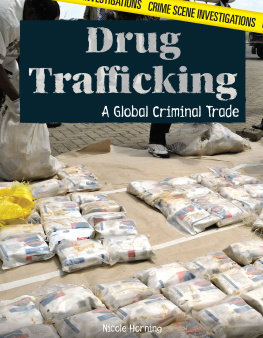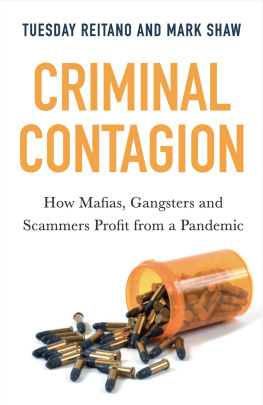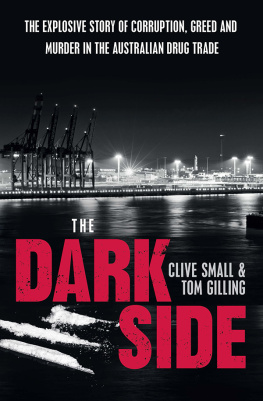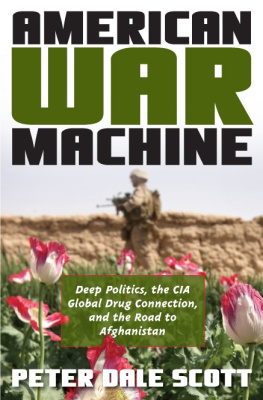CONTENTS
About the Book
Any newspaper anywhere in the world, any day, carries news about illegal migrants, drug busts, smuggled weapons, laundered money, or counterfeit goods. These newly globalized struggles pit governments against agile, well-financed networks of highly dedicated individuals. Religious zeal or political goals drive terrorists, but profit is no less a motivator for murder and mayhem. And the stakes are rising. It is estimated that the global trafficking of people is worth more than $10 billion a year. In Southeast Asia, an estimated 30 million women and children have been trafficked in the past ten years.
Who supplies pirated movies, CDs, or the knock-off Rolex sold for $20? Why is marijuana ever easier to find in schools and universities? Who is behind the illegal immigrants found suffocated to death in the backs of lorries? Illicit is the first book to reveal the shocking scale of this dark underground, and to show how the inner workings of the networks of illegal industries and new realities of globalisation combine to make them so successful and difficult to defeat.
About the Author
For the last six years, Moiss Nam has been editor and publisher of the influential journal Foreign Policy. Nam was minister of Trade and Industry in his native Venezuela, as well as an executive Director of the World Bank. Since 1989, he has been a forum fellow at the World Economic Forum and an advisor to its annual meeting in Davos. This is his first general trade book.
To Susana, Adriana, Claudia, and Andrs
Chapter 1
THE WARS WE ARE LOSING
THE FAMOUS FORMER United States president, for eight years the most powerful man on earth, was born in a small country town blessed with very good feng shui. As an adolescent struggling to excel in spite of his modest rural circumstances, he admired the ambition of Gu Yanwu, who said we should walk 10,000 miles and read 10,000 books. Often during his political career he sought wisdom and guidance in the sayings of Chairman Mao. As for the starstruck young intern with whom he had an affair that nearly destroyed his presidency, he had this to say: She was very fat.
The Chinese version of Bill Clintons autobiography In 2004 a master copy of the Nobel Prize winners first novel in ten years vanished without a trace from the printing press. Days later, a pirate edition could be found on Bogot sidewalks, its text accurate but for the final revisions that Garca Mrquez, a perfectionist, had been waiting until the last moment to turn in.
Laughable as they may seem, little separates these scams from others with far more dire consequences. The same knockoff markets sell not only bootleg books and DVDs but pirated Microsoft and Adobe software; not only faux Gucci and Chanel accessories but bogus brand-name machinery made with substandard parts that can cause industrial accidents; not only placebo Viagra for gullible mail-order shoppers, but also expired or adulterated medicines that dont cure but kill. In defiance of regulations and taxes, treaties and laws, virtually anything of value is offered for sale in todays global marketplaceincluding illegal drugs, endangered species, human chattel for sex slavery and sweatshops, human cadavers and live organs for transplant, machine guns and rocket launchers, and centrifuges and precursor chemicals used in nuclear weapons development.
This trade is illicit trade. It is trade that breaks the rulesthe laws, regulations, licenses, taxes, embargos, and all the procedures that nations employ to organize commerce, protect their citizens, raise revenues, and enforce moral codes. It includes purchases and sales that are strictly illegal everywhere and others that may be illegal in some countries and accepted in others. Illicit trade is highly disruptive, of course, to legitimate businessesexcept when it isnt. For as we shall see, there is an enormous gray area between legal and illegal transactions, a gray area that the illicit traders have turned to great advantage.
The marketing and distribution channels that transport all this contrabandand the financial circuits that move the hundreds of billions of dollars that it generates every yeararent exactly hidden from view. Some of the physical marketplaces can even be looked up in tourist guides to the worlds great cities: Silk Alley in Beijing, Charoen Krung Road in Bangkok, Canal Street in New York City. Others, like the arms and drugs bazaar town of Dara Adam Khel in northwest Pakistan or the multiproduct trafficking and money-laundering center of Ciudad del Este in Paraguay, serving the Argentine and Brazilian markets, arent exactly leisure spots but are no less widely known. Factories in the Philippines or China that produce licensed manufactured goods may run unauthorized second shifts with shoddy components. Shipments of methamphetamine and bootleg videos and night-vision military goggles often travel in the same containers and cargo holds as loads of semiconductors and frozen fish and grapefruit. The proceeds of illicit trade merge with the greatest of ease into the vast daily flow of interbank settlements and Western Union money transfers. And the Internet not only boosts the speed and efficiency of all of these trades but expands the possibilities by, for instance, hosting online markets for prostitutes from Moldova and Ukraine destined for shipment to markets in Britain, France, Germany, Japan, and the United States.
Neither are those who benefit from illicit trade always careful to hide in the shadows. Many exercise their trade in the open, daring authorities to crack down on themor inviting them to collude. In Thailand, a massage parlor operator ran for public office in full public view. Illicit traders may have forsaken grand, hubristic gesturesPablo Escobar Gaviria, the famed drug kingpin, in his heyday offered to pay up Colombias entire national debtbut they have grown sophisticated in forming front companies with complex financial structures spanning numerous countries, blurring their traces so well that they can safely operate in the open. Which means that not only is illicit trade on the rise, but its interplay with social crisisconflict, corruption, exploitationis more complex than it has been since the abolition of the Atlantic slave trade.
THREE ILLUSIONS
Yet in the face of all the evidence, at least three grand illusions persist in the way wethe public and the politicians in whom we place our trustaddress global illicit trade.
First is the illusion that there is nothing new. Illicit trade is age-old, a continuous facet and side effect of market economies or of commerce in general. Illicit trades ancestor, smuggling, traces back to ancient times, and many a thieves market survives in the worlds commercial hubs. Therefore, skeptics would argue that since smuggling has always been more a nuisance than a scourge, it is a threat we can learn to live with as we have always done.
But this skepticism ignores the important transformations of the 1990s. Changes in political and economic life, along with revolutionary technologies in the hands of civilians, have dissolved the sealants that governments traditionally relied on to secure their national borders. At the same time, the market-oriented economic reforms that swept the world in the 1990s boosted incentives to break through these sealantslegally or otherwise. Not only did the hold of governments on borders weaken, but the reforms amplified the rewards awaiting those who were prepared to break the rules.
Technology enlarged the market, not just geographically by lowering transport costs but also by making possible the trade in a whole range of goods that didnt exist before, such as pirated software or genetically modified marijuana. New technologies also made it possible to trade internationally products that in the past were hard or impossible to transport or hold in inventoryhuman kidneys, for instance. Markets, of course, were also enlarged when governments deregulated previously closed or tightly controlled economies and allowed foreigners to visit, trade, and invest more freely.
Next page






